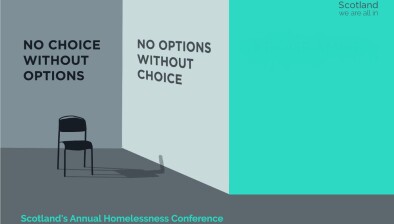UK news: Homelessness prevention ‘achievable’ within next Parliament
 Homelessness prevention could be ‘achievable’ for some of the most high-risk groups - care leavers, prison leavers and survivors of domestic abuse - within the next Parliament, according to an All-Party Parliamentary Group for Ending Homelessness (APPGEH) report.
Homelessness prevention could be ‘achievable’ for some of the most high-risk groups - care leavers, prison leavers and survivors of domestic abuse - within the next Parliament, according to an All-Party Parliamentary Group for Ending Homelessness (APPGEH) report.
The APPGEH, set up with the support of Crisis, is now urging the UK government to recognise the growing emergency of homelessness and establish a joined up, cross-government strategy to specifically tackle homelessness prevention among the identified groups.
Crucially, the report finds that with so many of these people already on the radar of police, local authorities, prisons and social services, it is ‘inexcusable’ that they should fall through the net, yet they continue to do so:
The report, resulting from a year of research and consultation with experts and those with lived experience of homelessness, recommends government departments work in partnership to audit existing policies and design programmes to specifically support care leavers, prison leavers and survivors of domestic violence.
As the government has committed to putting prevention at the heart of its future working, with the Homelessness Reduction Act and a manifesto commitment to launch a Homelessness Reduction Taskforce, the report says there is an opportunity to bring together national policies and local frontline work to prevent and end homelessness for these cohorts for good.
Neil Coyle MP, joint co-chair of the APPGEH, said: “A local authority should know exactly when a care leaver or prison leaver is making the transition from institutional life to independence and should be ready and prepared to step in at that stage. Similarly, survivors of domestic violence should be given a crime reference number as soon as they make a domestic violence report to the police.
“However, many survivors feel unable or too afraid to even report abuse to the police in the first place. Time and again these people are getting lost despite, in many cases, receiving assistance from public bodies which should be a trigger to prevent their homelessness. Homelessness prevention for these groups is an achievable goal.”
Will Quince MP, joint co-chair of the APPGEH, added: “The APPGEH championed the recently passed Homelessness Reduction Act but more must be done and more resources made available. This report demonstrates that with focused and evidence-based interventions there is nothing inevitable about homelessness for care leavers, prison leavers and survivors of domestic violence. It also gives government and other decision makers carefully thought through recommendations for action.”
Responding to the report, the Local Government Association said councils are already doing all they can to prevent homelessness.
Cllr Martin Tett, the Local Government Association’s Housing spokesman, said: “Councils want to end homelessness and are already doing everything they can within existing resources to prevent and tackle it. There is no silver bullet and councils alone cannot tackle rising homelessness.
“Care and prison leavers need support, as do the many others affected by rising rates of homelessness. Faced with rising housing costs, funding cuts and wide-ranging welfare reforms, it is increasingly challenging for councils to resolve increasing homelessness.
“Homelessness is everyone’s responsibility – it is crucial that national and local health, justice, employment and welfare partners work positively with councils to prevent it happening in the first place.
“Councils are doing all they can. On the day this report is released, we’ve launched our Housing Advisers Programme which will provide support to councils looking to innovate and improve in their efforts to help reduce homelessness.
“There is, however, no shortcut to the real solution to this problem. Councils need the powers, and access to funding, which will enable them to resume their historic role as a major builder of affordable homes. That means being able to borrow to invest in housing, and keep 100 per cent of the receipts from any homes they sell, to replace them and re-invest in genuinely affordable homes.”







